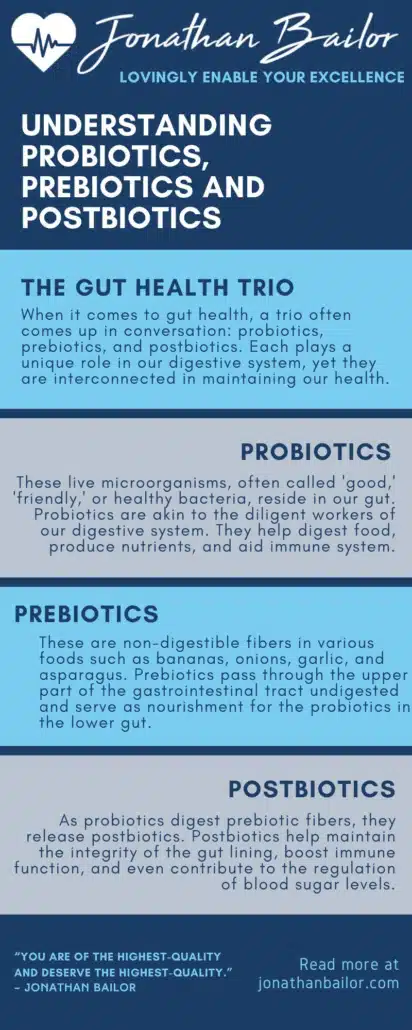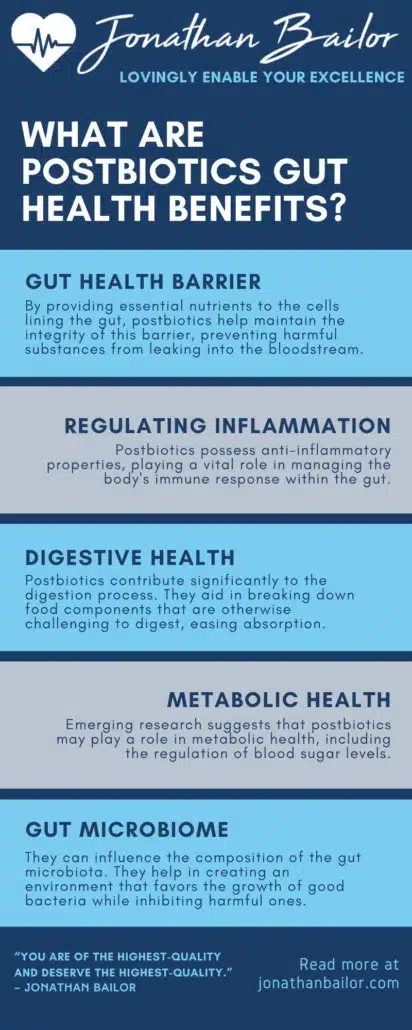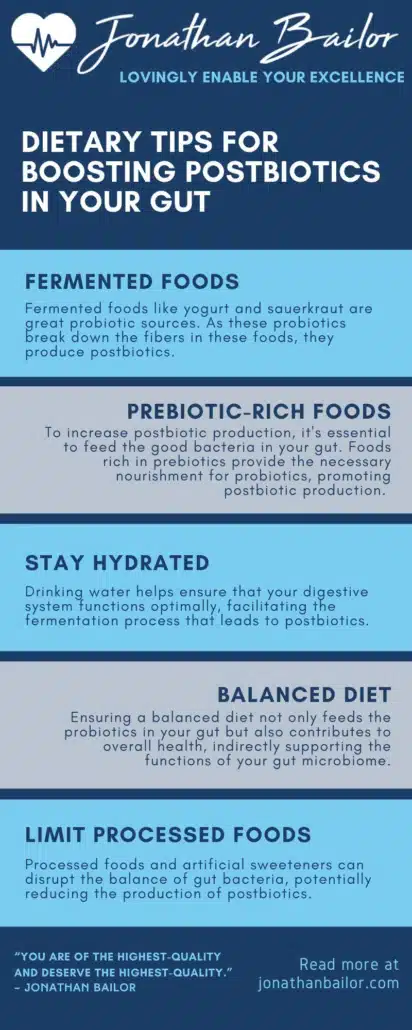What are Postbiotics, and Why are they Gaining Popularity in Gut Health?
In the ever-evolving world of health and wellness, there’s a new star on the horizon: postbiotics. While probiotics and prebiotics often steal the spotlight in gut health discussions, postbiotics are emerging as critical players in nurturing our well-being. Join Jonathan Bailor as he discusses the fascinating world of postbiotics in the gut health guide.
What exactly are postbiotics, and why are they capturing so much attention now?
Simply put, postbiotics are the beneficial byproducts produced when our friendly gut bacteria digest prebiotics, the fibers found in our diet. Think of them as the nutritious gifts left behind by probiotics after a feast of fibers. These byproducts aren’t just residual elements; they’re vital for our health, bolstering our immune system, aiding digestion, and even potentially uplifting our mood.
The growing interest in postbiotics is due to their remarkable stability and efficacy. Unlike some of their probiotic counterparts, postbiotics don’t require specific living conditions to survive. This resilience makes them reliable allies in our quest for a healthier gut.
Incorporating postbiotics into our daily lives doesn’t call for a diet revolution. It’s about simple, achievable adjustments: a fiber-rich diet, regular hydration, and a dash of fermented foods like yogurt or kimchi. These small steps can significantly enhance the postbiotic activity in our gut.
But here’s where the real excitement lies: understanding and embracing the role of postbiotics could revolutionize how we approach gut health. As we dive deeper into the science behind these microscopic marvels, we uncover a fascinating narrative of how our body’s internal ecosystem functions to keep us healthy.
Curious to learn more about this gut health game-changer? Read on and remember…this insight isn’t just for you; it’s a valuable share for friends and family too. Spread the word about postbiotics through a quick email or a social media share. Who knows, this simple act might positively impact someone’s health journey. Let’s explore and share the wonders of postbiotics together.
Understanding the Trio: Probiotics, Prebiotics, and Postbiotics
When it comes to gut health, a trio often comes up in conversation: probiotics, prebiotics, and postbiotics. Each plays a unique role in our digestive system, yet they are interconnected in maintaining our overall health.
Let’s break down what sets each one apart to better appreciate their individual contributions.
Probiotics
These live microorganisms, often called ‘good,’ ‘friendly,’ or healthy bacteria, reside in our gut. Probiotics are akin to the diligent workers of our digestive system. They help digest food, produce vital nutrients, and fortify our immune system.
Regular intake of probiotics through foods like yogurt and fermented products can help balance the gut’s microbial environment, supporting digestive health and even influencing mood regulation.
Prebiotics
Prebiotics feed probiotics, helping them grow and thrive. These are non-digestible fibers in various foods such as bananas, onions, garlic, and asparagus. Prebiotics pass through the upper part of the gastrointestinal tract undigested and serve as nourishment for the probiotics in the lower gut.
This selective feeding helps the beneficial bacteria to thrive and outcompete harmful bacteria, promoting a healthy gut microbiome.
Postbiotics
These are the biochemical byproducts of probiotic bacteria. As probiotics digest prebiotic fibers, they release postbiotics. This group includes various substances like short-chain fatty acids, which play a pivotal role in gut health. Postbiotics help maintain the integrity of the gut lining, boost immune function, and even contribute to the regulation of blood sugar levels.
Unlike probiotics, postbiotics are not live organisms, making them more stable and potentially easier for the body to utilize.

Feeling Better Is Priceless, That's Why We Don't Put A Price On It!
“It’s Like A Free and Medically Valid Version of Noom and Weight Watchers Online”
~ Dr. Doctor Matthew Oleshiak, MD
Click the 'LEARN MORE' button below for free lifetime access to the fast fix program developed by Jonathan and top Ivy League Medical Doctors
LEARN MOREP.S. It's not a free trial. It's not part of the program for free. The entire program is free, forever, for real! No credit card needed.
How Do Postbiotics Work?
The inner workings of postbiotics in the body are a fascinating subject, especially when we focus on compounds like butyrate or butyric acid. Butyrate, a short-chain fatty acid, is one of the key postbiotic substances produced when probiotics metabolize dietary fibers. This particular postbiotic plays a crucial role in maintaining the health of our gut lining. It acts as a primary energy source for the cells in the lining of the colon, promoting their growth and repair, which is essential for a strong and functional gut barrier.
Moreover, butyrate has been linked to anti-inflammatory properties. It helps in regulating the immune responses in our gut, thus preventing unnecessary inflammation which can lead to various gut-related disorders. There’s also emerging evidence suggesting that butyrate might play a role in regulating blood sugar levels and could be beneficial in metabolic health.
While the full spectrum of how postbiotics like butyrate work is still being uncovered, it’s clear that they are more than just passive byproducts. They actively contribute to our gut’s well-being and overall health. The fact that the exact mechanisms of action of postbiotics are not completely understood yet only adds to the intrigue and potential of these remarkable substances in the realm of health and nutrition. Understanding and harnessing their benefits could open new doors in promoting gut health and beyond.
Exploring the Gut Health Benefits of Postbiotics
The realm of gut health is continuously expanding, and postbiotics have emerged as key players in this landscape. These byproducts of probiotic activity are not just passive passengers in our digestive system; they actively contribute to our well-being in several significant ways.
Let’s explore some of the gut health benefits of postbiotics, shedding light on how these substances can be pivotal in maintaining and enhancing our digestive health.
Strengthening the Gut Barrier
One of the primary roles of postbiotics, such as butyrate, is to fortify the gut barrier. This barrier is our first line of defense against harmful substances and pathogens.
By providing essential nutrients to the cells lining the gut, postbiotics help maintain the integrity of this barrier, preventing harmful substances from leaking into the bloodstream. This function is crucial in reducing the risk of inflammation and infections, which are often the root causes of various digestive disorders.
Regulating Inflammation
Postbiotics possess anti-inflammatory properties, playing a vital role in managing the body’s immune response within the gut. This regulation is essential in preventing and mitigating inflammatory bowel diseases, such as Crohn’s disease and ulcerative colitis.
By keeping the immune response in check, postbiotics help maintain a balanced environment in the gut, conducive to overall health and well-being.
Supporting Digestive Health
Postbiotics contribute significantly to the digestion process. They aid in breaking down food components that are otherwise challenging to digest, facilitating nutrient absorption. This process is essential for overall digestive health, ensuring that our bodies efficiently utilize the nutrients from the food we consume.
Additionally, a well-functioning digestive system is key to preventing issues like bloating, constipation, and irregular bowel movements.
Enhancing Metabolic Health
Emerging research suggests that postbiotics may play a role in metabolic health, including the regulation of blood sugar levels. This function is particularly significant given the rising prevalence of metabolic disorders like type 2 diabetes.
By influencing how our bodies metabolize and use energy, postbiotics could be instrumental in managing and preventing metabolic health issues.
Promoting a Balanced Gut Microbiome
The presence of postbiotics in the gut can influence the composition of the gut microbiota. They help in creating an environment that favors the growth of beneficial bacteria while inhibiting harmful ones.
This balance is crucial for gut health, as a disrupted microbiome is often linked to various health issues, including digestive disorders, obesity, and even mental health conditions.
In summary, postbiotics offer a plethora of benefits for our gut health, ranging from strengthening the gut barrier to enhancing metabolic health. Postbiotics are becoming an increasingly important part of achieving optimal digestive health and overall well-being.

Enhancing Your Diet with Postbiotics: Practical Tips
As the importance of postbiotics in gut health becomes increasingly evident, many of us are keen to find ways to incorporate more of these beneficial compounds into our daily routines. Fortunately, boosting your intake of postbiotics doesn’t require drastic changes to your diet or lifestyle. With some simple and manageable adjustments, you can significantly enhance the postbiotic activity in your gut.
Here are a few practical tips on how to get more postbiotics into your system:
Include Fermented Foods in Your Diet
Fermented foods like yogurt, kefir, sauerkraut, kimchi, and kombucha are excellent sources of probiotics. As these probiotics break down the fibers in these foods, they produce postbiotics, including beneficial short-chain fatty acids.
Regularly incorporating these foods into your meals can help boost the production of postbiotics in your gut.
Consume Foods Rich in Prebiotics
To increase postbiotic production, it’s essential to feed the good bacteria in your gut. Foods rich in prebiotics, such as garlic, onions, bananas, asparagus, and Jerusalem artichokes, provide the necessary nourishment for probiotics, thereby promoting the production of postbiotics.
Including these foods in your diet can create a favorable environment for postbiotic synthesis.
Stay Hydrated
Adequate hydration is crucial for maintaining a healthy gut environment where probiotics can thrive and produce postbiotics.
Drinking plenty of water throughout the day helps ensure that your digestive system functions optimally, facilitating the fermentation process that leads to postbiotic production.
Consider a Balanced Diet
A diet rich in various fruits, vegetables, and lean proteins provides a wide range of nutrients that support gut health and, consequently, postbiotic production.
Ensuring a balanced diet not only feeds the probiotics in your gut but also contributes to overall health, indirectly supporting the functions of your gut microbiome.
Limit Processed Foods and Artificial Sweeteners
Processed foods and artificial sweeteners can disrupt the balance of gut bacteria, potentially reducing the production of beneficial postbiotics.
By limiting these in your diet and focusing on whole, unprocessed foods, you can maintain a healthier gut microbiome conducive to postbiotic synthesis.
Incorporating these simple strategies into your lifestyle can lead to an increase in postbiotic production, enhancing your gut health and overall well-being. Remember, small changes can make a significant impact, so start integrating these tips into your daily routine for a healthier you.

Gut Health FAQs: Understanding Your Digestive Wellness
Navigating the complex world of gut health can sometimes feel overwhelming. To help simplify this crucial aspect of well-being, here are answers to some frequently asked questions about gut health.
These insights aim to empower you with knowledge to make informed decisions for your digestive wellness.
What is the gut microbiome, and why is it important?
The gut microbiome refers to the trillions of microorganisms, including bacteria, viruses, and fungi, residing in our digestive system. This ecosystem plays a crucial role in digestion, nutrient absorption, and immune system function.
A balanced gut microbiome is essential for overall health, as it influences everything from metabolism to mood regulation. Disruptions in this balance can lead to various health issues, including digestive disorders, obesity, and even mental health conditions.
How can I tell if my gut health is poor?
Indicators of poor gut health often manifest as digestive issues like bloating, gas, constipation, or diarrhea. However, it can also show up as seemingly unrelated symptoms, such as unexplained fatigue, skin problems like eczema, frequent infections, and changes in mood or cognitive functions. These signs suggest that the gut microbiome might be imbalanced, impacting overall health.
Can gut health affect my mood and mental health?
Yes, there’s a significant link between gut health and mental health, often referred to as the gut-brain axis. The gut produces a large proportion of the body’sinfluencingey neurotransmitter that influences mood.
An imbalanced gut microbiome can impact serotonin production, potentially leading to mood disorders like anxiety and depression. Maintaining a healthy gut is, therefore, crucial not just for physical health but also for mental well-being.
What are the best foods to eat for a healthy gut?
Foods that support gut health typically include those rich in fiber, like fruits, vegetables, and legumes. These act as prebiotics, feeding the beneficial bacteria in your gut. Fermented foods such as yogurt, kefir, and kimchi are also excellent, as they introduce probiotics into your system.
Additionally, foods containing polyphenols, like berries, nuts, and seeds, are beneficial for gut health.
Can lifestyle changes improve my gut health?
Absolutely. Lifestyle choices have a significant impact on gut health. Regular physical activity, adequate hydration, stress management, and getting enough sleep all contribute to a healthier gut.
These habits, along with a balanced diet rich in fiber and probiotics, can create an ideal environment for a thriving gut microbiome, enhancing your overall health and well-being.
Embracing Gut Health: A Journey Worth Sharing
As we conclude our exploration of gut health, it’s clear that understanding and nurturing our gut microbiome is vital for our overall well-being. From the fortifying effects of postbiotics to the balancing act of probiotics and prebiotics, each element plays a crucial role in our digestive and overall health. Remember, small, consistent changes in diet and lifestyle can make a significant impact.
If you’ve found value in this journey into gut health, consider sharing this knowledge with friends and family. Spread the social media platforms or through email, and embark on a collective journey towards better health and wellness.
Feeling Better Is Priceless, That's Why We Don't Put A Price On It!
“It’s Like A Free and Medically Valid Version of Noom and Weight Watchers Online”
~ Dr. Doctor Matthew Oleshiak, MD
Click the 'LEARN MORE' button below for free lifetime access to the fast fix program developed by Jonathan and top Ivy League Medical Doctors
LEARN MOREP.S. It's not a free trial. It's not part of the program for free. The entire program is free, forever, for real! No credit card needed.




